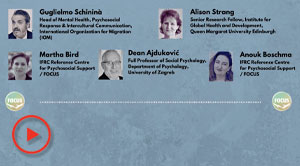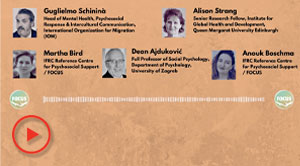“Trauma is something deeply personal and I realize that it should be treated individually. But the structural problem creating trauma in Europe, is the fact that we have said it is a crisis, and we have to protect the border by any and every mean.” – Villads Zahle, Senior Communications Coordinator in the European Council on Refugees and Exiles
In this episode of Heartbeat of Humanity, Communications Officer Jesper Guhle explores the potential mental health consequences for people forced to migrate and what the Red Cross Red Crescent Staff and volunteers can do to support these people. Jesper interviews Villads Zahle, Senior Communications Coordinator in the European Council on Refugees and Exiles, Barly, dancer, artist, podcaster and chef, and Sarah Harrison, Technical Advisor in the IFRC Psychosocial Centre.
“You don’t have the power to decide where you are going and for how long you are going. Mentally, being inside the camp is torture,” says Barly, dancer, artist, podcaster and chef.
For two-and-a-half years, Barly lived in 15 different asylum centres with no explanations. He did not receive information or updates on the progress of his case or how long he would stay there. As Barly says, he didn’t have control over his own decisions and had no idea how long he would have to be in that position.
“From day one, they already make you feel like you are not part of society. The system doesn’t help you get integrated and you stay in just in one place. Even if you get your papers or you get asylum, you don’t really feel like you are part of society,” says Barly.
Sarah offers several tools to support National Societies in providing MHPSS services for migrants. Given the nature of changing migration routes, supporting individuals and families on the move poses several challenges for National Societies. However, Sarah encourages National Societies to train their staff and volunteers in psychological first aid (PFA) to increase their capacity in receiving migrants experiencing high levels of emotions and distress.
“PFA is an expression of humanity. It is one volunteer being a human, showing empathy, kindness and support to another human. That can be quite powerful for migrants who may not have received that type of relationship from another person in a while on migration routes, which are normally quite harsh environments,” Sarah says.
14 minutes into the podcast, Jesper plays music from a video made by ECRE.
Find the music video here.
“Migration is one of the most pressing topics facing the world today. At the PS Centre we are committed to continue working on this important area, aiming to increase awareness of existing resources, strengthen knowledge and support meaningful and evidence-informed practice to better serve communities,” says PS Centre Technical Advisor Michelle Engels.
The PS Centre has published several publications on MHPSS for migrants and it has also partnered in several projects that support migrants and refugees. These include FOCUS and two H2020 research & innovation consortia focused on MHPSS for migrants/refugees including children: REFUGE-ED and STRENGTHS.
FOCUS aims at deepening the understanding of critical dimensions of integration, taking stock of the decade passed since the unparalleled influx of more than 1 million refugees and migrants from Syria and other countries, with a special emphasis on psychological and social factors; and by making this knowledge accessible in an efficient and useful way.
FOCUS provides multiple resources such as a write-up on a discussion about the role of MHPSS in facilitating dynamic integration of migrants in the EU, followed by two accompanying podcasts about mental health and psychosocial support in dynamic integration.
Access the PS Centre Resource Library for resources designed to ensure MHPSS in migrant and refugee settings.



